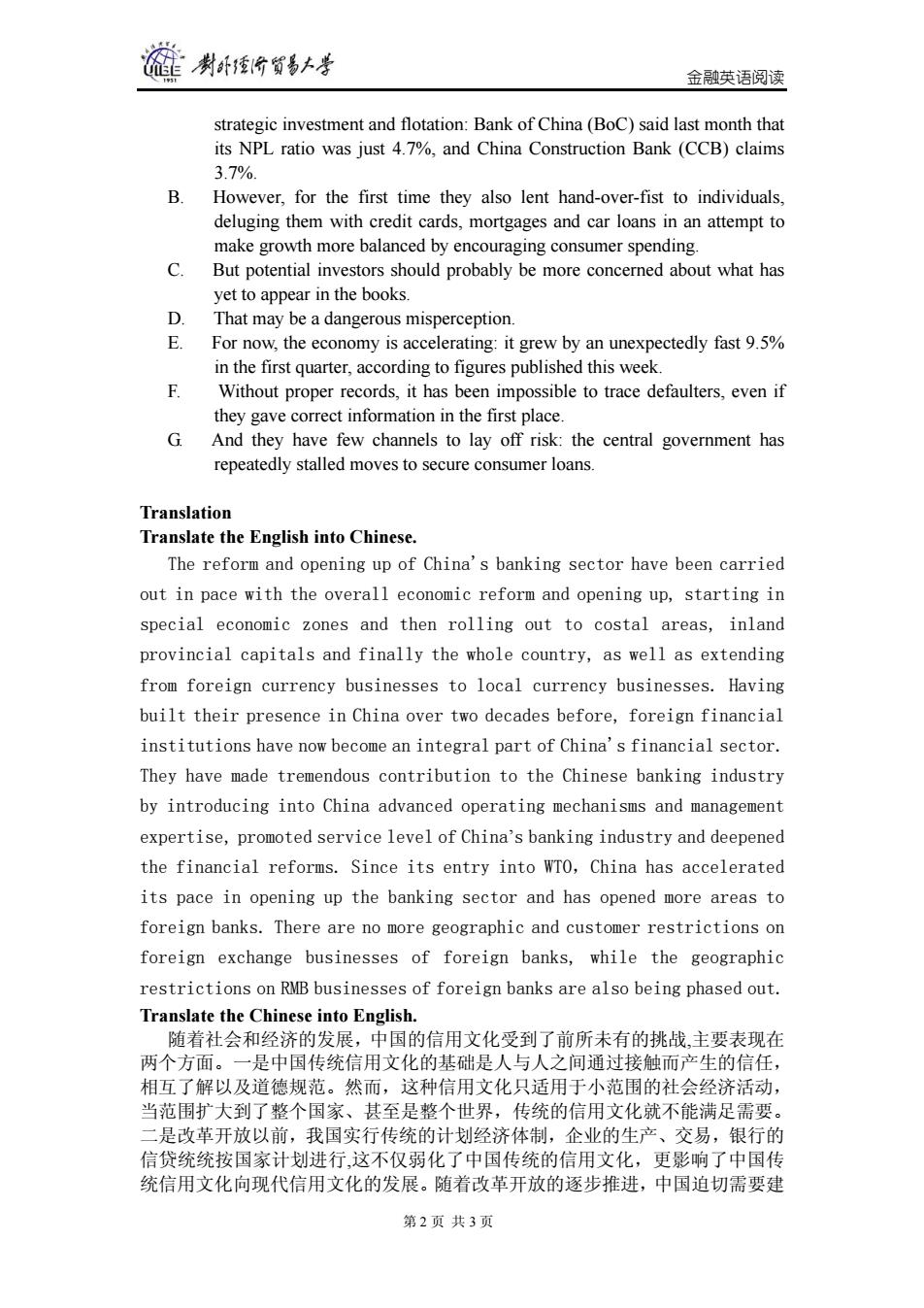正在加载图片...

制卧价贸易卡考 金融英语阅读 strategic investment and flotation:Bank of China(BoC)said last month that its NPL ratio was just 4.7%,and China Construction Bank (CCB)claims 3.7%. However,for the first time they also lent hand-over-fist to individuals, deluging them with credit cards,mortgages and car loans in an attempt to make growth more balanced by encouraging consumer spending C.But potential investors should probably be more concerned about what has yet to appear in the books. D. That may be a dangerous misperception. E. For now,the economy is accelerating:it grew by an unexpectedly fast 9.5% in the first quarter,according to figures published this week. F Without proper records,it has been impossible to trace defaulters,even if they gave correct information in the first place. G And they have few channels to lay off risk:the central government has repeatedly stalled moves to secure consumer loans. Translation Translate the English into Chinese. The reform and opening up of China's banking sector have been carried out in pace with the overall economic reform and opening up,starting in special economic zones and then rolling out to costal areas,inland provincial capitals and finally the whole country,as well as extending from foreign currency businesses to local currency businesses.Having built their presence in China over two decades before,foreign financial institutions have now become an integral part of China's financial sector. They have made tremendous contribution to the Chinese banking industry by introducing into China advanced operating mechanisms and management expertise,promoted service level of China's banking industry and deepened the financial reforms.Since its entry into WTO,China has accelerated its pace in opening up the banking sector and has opened more areas to foreign banks.There are no more geographic and customer restrictions on foreign exchange businesses of foreign banks,while the geographic restrictions on RMB businesses of foreign banks are also being phased out. Translate the Chinese into English. 随着社会和经济的发展,中国的信用文化受到了前所未有的挑战,主要表现在 两个方面。一是中国传统信用文化的基础是人与人之间通过接触而产生的信任, 相互了解以及道德规范。然而,这种信用文化只适用于小范围的社会经济活动, 当范围扩大到了整个国家、甚至是整个世界,传统的信用文化就不能满足需要。 二是改革开放以前,我国实行传统的计划经济体制,企业的生产、交易,银行的 信贷统统按国家计划进行,这不仅弱化了中国传统的信用文化,更影响了中国传 统信用文化向现代信用文化的发展。随着改革开放的逐步推进,中国迫切需要建 第2页共3页金融英语阅读 第 2 页 共 3 页 strategic investment and flotation: Bank of China (BoC) said last month that its NPL ratio was just 4.7%, and China Construction Bank (CCB) claims 3.7%. B. However, for the first time they also lent hand-over-fist to individuals, deluging them with credit cards, mortgages and car loans in an attempt to make growth more balanced by encouraging consumer spending. C. But potential investors should probably be more concerned about what has yet to appear in the books. D. That may be a dangerous misperception. E. For now, the economy is accelerating: it grew by an unexpectedly fast 9.5% in the first quarter, according to figures published this week. F. Without proper records, it has been impossible to trace defaulters, even if they gave correct information in the first place. G. And they have few channels to lay off risk: the central government has repeatedly stalled moves to secure consumer loans. Translation Translate the English into Chinese. The reform and opening up of China's banking sector have been carried out in pace with the overall economic reform and opening up, starting in special economic zones and then rolling out to costal areas, inland provincial capitals and finally the whole country, as well as extending from foreign currency businesses to local currency businesses. Having built their presence in China over two decades before, foreign financial institutions have now become an integral part of China's financial sector. They have made tremendous contribution to the Chinese banking industry by introducing into China advanced operating mechanisms and management expertise, promoted service level of China’s banking industry and deepened the financial reforms. Since its entry into WTO,China has accelerated its pace in opening up the banking sector and has opened more areas to foreign banks. There are no more geographic and customer restrictions on foreign exchange businesses of foreign banks, while the geographic restrictions on RMB businesses of foreign banks are also being phased out. Translate the Chinese into English. 随着社会和经济的发展,中国的信用文化受到了前所未有的挑战,主要表现在 两个方面。一是中国传统信用文化的基础是人与人之间通过接触而产生的信任, 相互了解以及道德规范。然而,这种信用文化只适用于小范围的社会经济活动, 当范围扩大到了整个国家、甚至是整个世界,传统的信用文化就不能满足需要。 二是改革开放以前,我国实行传统的计划经济体制,企业的生产、交易,银行的 信贷统统按国家计划进行,这不仅弱化了中国传统的信用文化,更影响了中国传 统信用文化向现代信用文化的发展。随着改革开放的逐步推进,中国迫切需要建